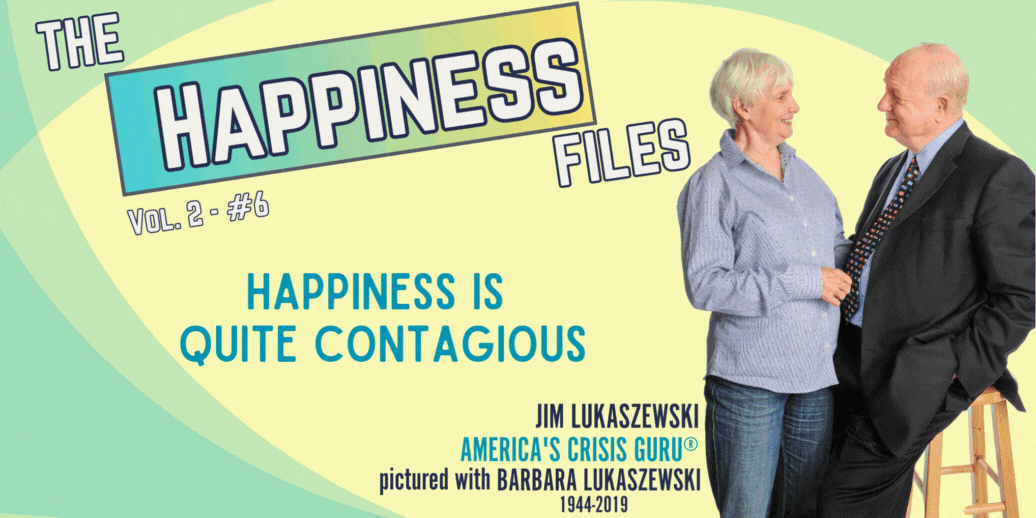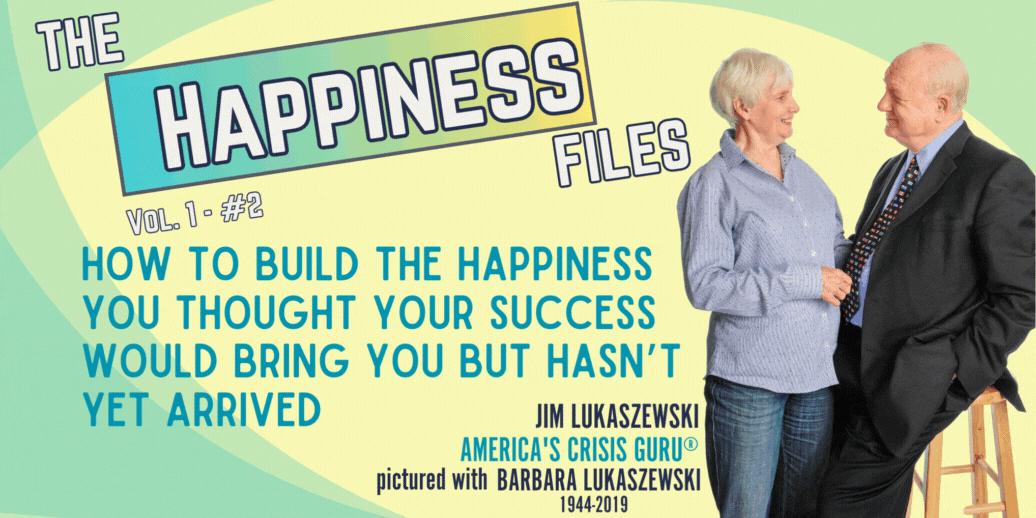The most frequent question I get asked when I talk about Civility and Happiness is, “How do you get this started? What’s the first step?”
My answer is simple, direct, and prompt:
- Be a happy person every day in every way.
- Happiness is a habit others will notice. Insist on dealing happily on whatever comes along. When you run into someone who is intentionally negative, because being negative is always intentional, abandon them. Just walk away and do your thing somewhere else. If they follow you, ask them politely, but firmly to step back and walk away.
- BE THE ONE ready to suggest a happier, more constructive way to do or say whatever life presents.
Get Your Tissues Out
A Very Special Christmas
One of my favorite stories about happiness came to me from someone in an audience who said she really wanted to thank me for helping her reconnect with her younger sister who had become estranged over the years. She said, “I heard you talk about being positive, it seemed so wonderful, but so impossible. Nevertheless, I took your advice and just did them. It happened last Christmas, which is the one time a year when our families get together. It’s usually pretty tense among the adults. We tell ourselves we get together for the kids. But of course, “it’s a bit of a nightmare for them.”
“This year was going to be different. I decided that I would find ways to discuss and talk about things and tell stories in completely positive fashion avoiding all negative words, criticism, and negative thinking. My sister was her usual self, anticipating that we would have these negative clashes and would walk away wondering why we were doing this for yet another year. But I really wanted to see something change.”
“I talked to my kids about it and they promised to really work hard to do and say positive things the entire time.” When they were confronted with negative things simply absorb it and take a positive approach.
“I have to say that I believed that the meeting with my sister’s family was just a bit more positive than in the past. But still it was really hard because the old habits kept creeping back and my sister was her usual kind of negative self.”
“We had occasion to talk on Valentine’s Day. She called me. This surprised me.
I was always the one who called her. And her first comment was, “I’ve been meaning to talk to you about what happened over the holiday.” With some trepidation, I asked her what happened over the holiday? She said, “Well I’m not sure, except that I really had a good time and many of the old squabbles and things we talk about routinely just never happened.” I’m trying to figure out why was that. So we talked and I told her about you and about your ideas about taking responsibility for everybody’s happiness beginning with yourself. “She actually started to cry.” Then told a story. Then I told one and we were both in tears, tears of reconciliation, apology, even joy.”
She touched my arm and walked away.
Our Mother Died Badly
The second story involves a woman I saw after a powerful presentation. She said, “I had the most amazing experience because of you and because of the surprising generosity of others. And I just wanted to tell you about it.” So she began saying, “My mother became ill later in her life and spent a lot of her time in hospitals. In the last hospital she was in, where she did pass away, there were accidents and things that went wrong continuously during her care. On the day she died, our family decided to hire an attorney and approach the hospital about some kind of apology, correction, something that forcefully brought to their attention the problems that my mother suffered as her life ended.
To make our point even more boldly, we asked to meet with the top hospital officials in my mother’s former sick room. To our surprise, they readily agreed and when we arrived at my mother’s room it became a totally amazing experience.”
“There were six or seven people in the room, including the hospital administrator, their legal counsel, and a number of other personnel in their professional medical uniforms which they didn’t generally wear. The hospital administrator took a breath and said, “These people, all cared for your mother every day. They will all say they are terribly sorry about what happened to her but, all have some things and stories about your mother that you might not know, but would like to hear.” The nurses introduced themselves they were the day, midday, and swing shift main supervisors. There was a young man, a hospital orderly and a couple others. The hospital orderly went first. He said, “I don’t think you know that your mother was a competitive pinochle player.” We were stunned. My daughter said, “I never saw her ever play a card game.” The young man said, “Well, she played for a time every single day. One of my jobs became finding other patients and employees in the hospital who could play. She got really good.” Each person had a personal story about her and even about the incidents which so concerned us.”
“They all apologized for mom’s suffering then said their goodbyes. The Administrator suggested that when we were ready to talk to him we could meet in his more comfortable conference room.”
“We sent our attorney home.”
Happiness Can Teach A Lot
The principal lesson has always been, if you give happiness a chance it’s pretty powerful. But the most important lesson for you is that happiness starts with you, and gives you the most satisfaction.
Getting started is easier than you think.
Send a simple thank you to someone who has helped you, who you’ve never really seriously acknowledged. Practice unconditional happiness relentlessly, look for the happy things. You’ll be happily surprised how often people you thanked, respond. I’d love to hear your stories about giving happiness a chance in your life and the lives of those you care about. Good luck!


